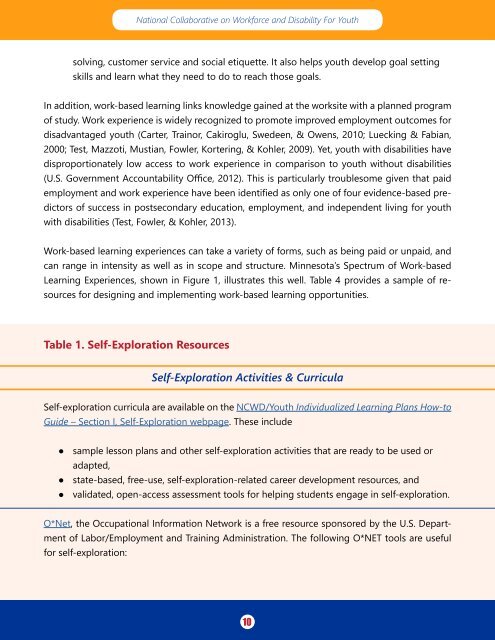Designing Statewide Strategies & Programs
DesigningStatewideCareerDevelopmentStrategiesProgramsPub_0
DesigningStatewideCareerDevelopmentStrategiesProgramsPub_0
Create successful ePaper yourself
Turn your PDF publications into a flip-book with our unique Google optimized e-Paper software.
National Collaborative on Workforce and Disability For Youth<br />
solving, customer service and social etiquette. It also helps youth develop goal setting<br />
skills and learn what they need to do to reach those goals.<br />
In addition, work-based learning links knowledge gained at the worksite with a planned program<br />
of study. Work experience is widely recognized to promote improved employment outcomes for<br />
disadvantaged youth (Carter, Trainor, Cakiroglu, Swedeen, & Owens, 2010; Luecking & Fabian,<br />
2000; Test, Mazzoti, Mustian, Fowler, Kortering, & Kohler, 2009). Yet, youth with disabilities have<br />
disproportionately low access to work experience in comparison to youth without disabilities<br />
(U.S. Government Accountability Office, 2012). This is particularly troublesome given that paid<br />
employment and work experience have been identified as only one of four evidence-based predictors<br />
of success in postsecondary education, employment, and independent living for youth<br />
with disabilities (Test, Fowler, & Kohler, 2013).<br />
Work-based learning experiences can take a variety of forms, such as being paid or unpaid, and<br />
can range in intensity as well as in scope and structure. Minnesota’s Spectrum of Work-based<br />
Learning Experiences, shown in Figure 1, illustrates this well. Table 4 provides a sample of resources<br />
for designing and implementing work-based learning opportunities.<br />
Table 1. Self-Exploration Resources<br />
Self-Exploration Activities & Curricula<br />
Self-exploration curricula are available on the NCWD/Youth Individualized Learning Plans How-to<br />
Guide – Section I, Self-Exploration webpage. These include<br />
●●<br />
●●<br />
●●<br />
sample lesson plans and other self-exploration activities that are ready to be used or<br />
adapted,<br />
state-based, free-use, self-exploration-related career development resources, and<br />
validated, open-access assessment tools for helping students engage in self-exploration.<br />
O*Net, the Occupational Information Network is a free resource sponsored by the U.S. Department<br />
of Labor/Employment and Training Administration. The following O*NET tools are useful<br />
for self-exploration:<br />
10


